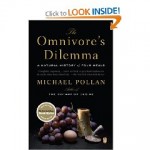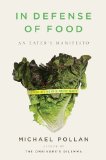Michael Pollan
Books: Science | Food | Botany
The Omnivore's Dilemma (2006), In Defense of Food: An Easter's Manifesto (2008)
The Omnivore's Dilemma (2006)
 I picked up The Omnivore's Dilemma a year or so ago, and it sat by the bed, waiting to be read for the longest time. However, once I gave up trying to finish Herodotus, I started to enjoy reading non-fiction again, and was able to pick-up and read The Omnivore's Dilemma without the guilt of another unfinished book looking over me.
I picked up The Omnivore's Dilemma a year or so ago, and it sat by the bed, waiting to be read for the longest time. However, once I gave up trying to finish Herodotus, I started to enjoy reading non-fiction again, and was able to pick-up and read The Omnivore's Dilemma without the guilt of another unfinished book looking over me.
The Omnivore's Dilemma hits a large number of food related issue I've been concerned with for years. It's an in depth look at where our food comes from, and the impact this process has upon us as individuals and as a society. In doing so, he looks at four different meals, and the path the items in those meals took to arrive as his dinner.
The section that surprised me the least was on industrial food. I've read Fast Food Nation, and I've done my research and know just how damaging industrial farming is. To look at industrial farming, Michael Pollan purchased a single cow, and followed that cow from birth to hamburger. That look following (for the most part) an individual animal through the food chain allows us to see how different industrial farming is from the idea of farming that most American's have in their minds.
It was also interesting to consider how people (American's specifically) feel about food. We have a strange and not very healthy relationship with food, and are always looking for shortcuts and secrets and ways to get the most of the least or vice versa. To that end I was struck by a quotation from Harvey Levenstein about American beliefs regarding food:
(T)hat taste is not a true guide to what should be eaten; that one should not simply eat what one enjoys; that the important components of food cannot be seen or tasted, but are discernible only in scientific laboratories; and that experimental science has produced rules of nutrition that will prevent illness and encourage longevity.
That may be the most depressing look at food I've ever seen. No wonder Americans have such a love hate relationship with food. “Taste is not a true guide to what should be eaten” seems truly horrifying to me. Food should taste good. Yes, it should also be healthy, but the two are not mutually exclusive. The idea of living a life where one eats scientifically rather than eating for taste is like a nightmare. Yes, sometimes–perhaps even many times–I find myself eating for sustenance and placing taste secondary, but I am coming to believe that if one wants to have a healthy relationship with food, what we eat has to be more than just sustenance.
The section that surprised me the most was part of the section on organic farming. I frequently buy organic and natural foods, for a variety of reasons. What surprised me was that the large organic companies often have industrial practices. What I read was not enough to change my eating and purchasing habits significantly, but it did further encourage me to try and eat locally whenever possible. Especially after the chapters on Polyface farms and small farming. Can small farming support the population of the US? Probably not. But there has to be some compromise between the two that gives us the best of both worlds: large scale farming without the industrial waste and cruelty.
I think this was, for me, one of the most important points of the book, and sums up what I've felt for years.
(P)eople who care about animals should be working to ensure that the ones they eat don't suffer, and that their deaths are swift and painless…
Yes, that's it precisely, and is the root of how I try to eat ethically. Except of course that my concern is not just for animal welfare, but also for the welfare of the humans who plant, grow, and process the food.
The section on foraging was both familiar and strange to me. I have friends who hunt, so I understand the basic ideas, and thought his experience with hunting was fascinating. But I know nothing about mushroom hunting, and had never realized quite how difficult and time consuming it was.
If you are unfamiliar with industrialized farming, or are just curious where the food you eat comes from, I highly recommend The Omnivores Dilemma. Michael Pollan has tried to present the different forms of agriculture showing both the strengths and weaknesses of each system, and did so in an even-handed way.
Rating: 8/10
In Defense of Food: An Easter's Manifesto (2008)
 After reading The Omnivore's Dilemma I picked up In Defense of Food to see what he had to say about the Western Diet and what most Americans eat.
After reading The Omnivore's Dilemma I picked up In Defense of Food to see what he had to say about the Western Diet and what most Americans eat.
OK. I have to admit that I didn't particularly learn a lot reading this book, because I've had a long fascination with food and nutrition, but I enjoyed the way he explored the issue and I believe he does a very good job presenting what he has discovered.
Plus, he really seems to like food. That may sound like a somewhat foolish thing to say, but other books on nutrition and eating often feel like they're written by someone who eats to live, not someone who lives to eat. If you've ever eaten food made by someone in the former category, you know there is a tremendous difference between the two.
(O)ur Puritan roots also impeded a sensual or aestetic enjoyment of food. Like sex, the need to eat links us to the animals, and historically a great deal of Protestant energy has gone into helping keep all such animal appetites under control.
In this book, Michael Pollan looks at the Western diet, and Americans have health and weight issues at a much higher rate than the rest of the world. First and foremost he believes that “nutrition” as a science has nothing to do with diet and eating. Nutritionists (for the most part) look at the individual components of foods. However, we don't eat individual components, we eat whole foods. He mentions some of the problems this has lead to, including the study on beta carotene that had to be stopped because as a supplement, beta carotene was leading to an increase in cancer rates even though diets high in beta carotene were associated with a lower incidence of cancer.
We have good reason to believe that putting nutritionists in charge of the menu and the kitchen has not only ruined an untold number of meals, but also has done little for our healthy, except very possibly to make it worse.
That's right, made our health worse.
USDA figures show a decline in the nutrient content of the forty-three crops it has tracked since the 1950s.
This goes back to a point I've made before: industrial agriculture is a terrible way to grow and raise food, and much of what Michael Pollan discusses supports this.
The human animal is adapted to, and apparently can thrive on, an extraordinary range of different diets, but the Western diet, however you define it, does not seem to be one of them.
If you eat--and we all do--you need to read what Michael Pollan has to say about eating and food and the Western diet.
Rating: 8/10
